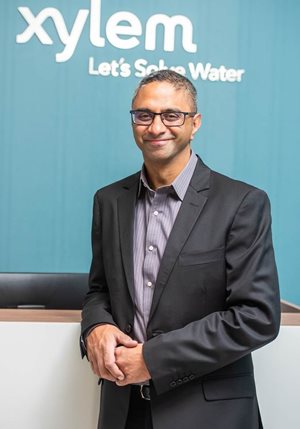South Africans have a constitutional right to water, and our society has made substantial gains since 1994 to meet that right. But we're also a water-scarce country and face several severe water challenges. Fortunately, there is a lot we can do - and the water industry can help meet these challenges.

Chetan Mistry, strategy and marketing manager at Xylem Africa
It's not difficult to find examples of water problems across South Africa. The most current and stark situation is in the Eastern Cape, where senior citizens have to walk kilometres to find water when their local taps run dry. Not too long ago, Cape Town reached a tremendous state of water shortages, and the financial capital Johannesburg is struggling to maintain supplies as power failures and infrastructure demands cause distribution shortages.
These are serious realities that may seem insurmountable. Yet our understanding and improvements for managing water can overcome them. More South Africans today have access to water than ever before. If we can tackle our most crucial local water challenges, we can secure this precious resource for generations. How do we do that?
Unpacking the challenges
Let's look at those pressing challenges and how we can solve them. SA is a water-scarce country, prone to droughts and highly dependent on water distribution — a situation that will only grow more acute as climate change affects rainfall patterns. As a nation, we have very high water consumption levels—235 litres per person daily, well above the world average of 185 litres.
Rapid urbanisation is adding significantly to that consumption rate. Since 2016, Gauteng has grown
by at least a million people, and the Western Cape's population has grown by 79% between 1995 and 2018. Yet neither region's infrastructure has kept up, nor have other places. Experts estimate only a third of SA's water infrastructure is operational.
Failing water infrastructure results in significant financial losses. Over 40% of water piped by local municipalities (around 70 million litres per day) doesn't reach its destination, costing local economies more than R7bn annually. And while we worry about the rising electricity costs, water costs are outpacing those and have increased 1,270% since 1996, compared to 1,120% for electricity tariffs.
Fixing SA's water
All the above make for bad news, but cooperation can deliver several overlapping fixes.
There isn't much we can do about droughts, but we can hugely improve our water efficiencies. On an individual level, we can save a lot of water through water awareness education, particularly at schools and among communities. The more local people become custodians of their water supply, the more they will protect it. Part of that process is to popularise water tanks, rainwater capture, and recycling grey water to sustain gardens, household activities, car washes and numerous other uses.
Such good habits can extend into different industries. Water's rising cost makes efficiency a priority. Fortunately, modern water technologies are up to the challenge. Farmers can invest in improvements such as drip irrigation and create mini earth water breaks to prevent excessive runoffs. Mining and manufacturing groups can recycle water and use data analytics to reduce water costs and wasteful consumption.
The water industry helps
Water technologies and their ecosystems play a big role in supporting public infrastructure. Since 2022, emergency measures have fixed over 9,700 leaks, often using modern leak detection systems. Infrastructure is also being revitalised, such as modern, efficient and environmentally-friendly UV sanitation upgrades to Cape Town Strandfontein Wastewater Treatment Works.
Yet we can do more. Many cities and towns cannot keep up with water infrastructure's skills and financial demands. The water industry can provide affordable access to equipment through rentals and repairs, and reduce costs by manufacturing some components inside the country. We can help stem the losses from non-revenue water resulting from leaks and water theft.
Our partner networks have many skilled professionals who can collaborate with local municipalities, helping them fix immediate problems, recoup financial losses, and retrofit older sites with new efficient enhancements. And water companies can proactively inform people about water through community events and fun youth education.
South Africa has the tools to address our water challenges. We can create a future where people don't have to walk kilometres to find a working tap, towns make reliable revenue from water, and the state meets its constitutional promise that everyone deserves access to water.






































